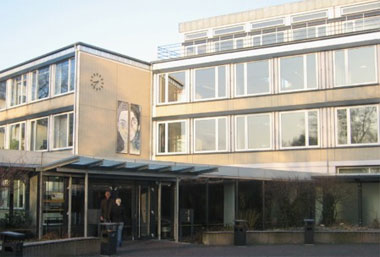Westfalen Kolleg, Paderborn - Germany

The Westfalen-Kolleg Paderborn was founded in 1964 and is named
after Westphalia, the western part of the federal state of North
Rhine Westphalia. It is one of three in NRW that are supervised
by the state authorities of NRW rather than by the city
authorities like grammar schools are.
The purpose of the school is to educate adults who after their
final examination (called “Abitur”) can study at any university
afterwards.
When the school was founded it was meant to give successful
tradesmen and businessmen that did not have the formal school
education and examination, the chance to acquire these
qualifications. Thus still today, students generally have to be
at least 18 years of age at the start. The oldest student I can
remember was 42 at his start. A complete course from beginning to
end takes 3 years (6 semesters) unless a student fails a semester
(or the final examination) and has to repeat it.
At present the WKPB has about 520 students overall and 46 teaching staff.
Similar to grammar schools the WKPB offers different subjects from
maths, biology, chemistry as well as physics, history, sociology,
geography, English, French, German and Latin to arts and sports.
We are proud to offer 17 subjects altogether - some compulsory and
others additional - from which the students can choose.
Students in this branch of the WKPB are expected not to have jobs.
Lessons start at 7.50 h in the morning from Monday to Friday and end
at 18.15 h. However, students do not have to cope with such an
amount of teaching every day. During the first two semesters lessons
usually end at 13.00 h. Later, students may have a long break in the
middle or start late according to the subjects they have chosen.
Apart from these ‘traditional’ courses the WKPB also offers - and
don’t you laugh - “Evening Classes in the Morning” (Abendgymnasium
am Vormittag). This is a branch of our school that offers lessons
like traditional evening schools do (i. e. a smaller range of
subjects and a limited choice for the students); but the WKPB
offers them from 8.00h to 11.20h in the morning. The participants
will have the same qualifications after their final exams at the
end of three years. Experience shows that there is a higher
proportion of women in this particular branch because mothers can
send their own children off to school before they go to school
themselves or fetch them from kindergarten after lessons or be home
in the afternoon for different reasons.
Additionally, since 2002, the WKPB has offered “Abitur Online” which
is a course requiring students to be present in the same classroom
with their teachers merely 50% of the time. At present attendance
times are on Friday evenings (17.30 h – 21.45 h) and Saturday
mornings (8.30 - ~14.00 h). The other 50% of the lessons are spent
online. Students have to read texts, watch films, answer questions,
work in groups, discuss solutions or difficulties, hand in essays
etc. online, and they can do so at their own speed and time.
Occasionally in the evening, they even “assemble” in a virtual
classroom to talk to each other and their teacher or to draw/write
on a whiteboard. This makes participation easier for those students
who do not live in Paderborn, for those who cannot ask for leave
from their work every day, but perhaps just one (i. e. Friday)
afternoon. It is a great advantage of these classes that not
everybody always has to be at the same place at the same time
throughout. These courses require great self-discipline on the part
of the students, and those who manage to hold out are usually quite
successful in the end.
On top of everything else there are, of course, extra-curricular activities.
The WKPB has had a small theatrical company for more than 15 years
now: “Das Schwarze Theater” (Black Theatre). Under the guidance of
a colleague present-day students and former ones rewrite, adapt and
rehearse plays and have performed successfully not only in our
school and in Paderborn, but also in Berlin, at Documenta IX as
well as Documenta X in Kassel, at Expo 2000 in Hannover and other
places in Germany.
Not only have they been awarded prizes, but members of the team
also teach other groups (students and pupils) how to perform on
stage convincingly.
Moreover, the WKPB is a “European School” and has partner
institutions in 25 of the 27 European countries, from Finland to
Malta and from Slovakia to Ireland, not to mention next-door
neighbours. Teachers and students of these institutions develop
ideas for different projects, work on them together at various
locations, publish the result and try to spread the acquired
nowledge to all the other partners. A recent success has been the
project ‘JIP’ (jokes, idioms, proverbs) which showed differences and
similarities in our European languages. The resulting drawings on
cards (thanks to a Polish artist) and a board game can now be used
in teaching languages at different levels in various institutions.

Fuer Kontakt:kokolelebi@aol.com
